#inequality in medicine
Explore tagged Tumblr posts
Text
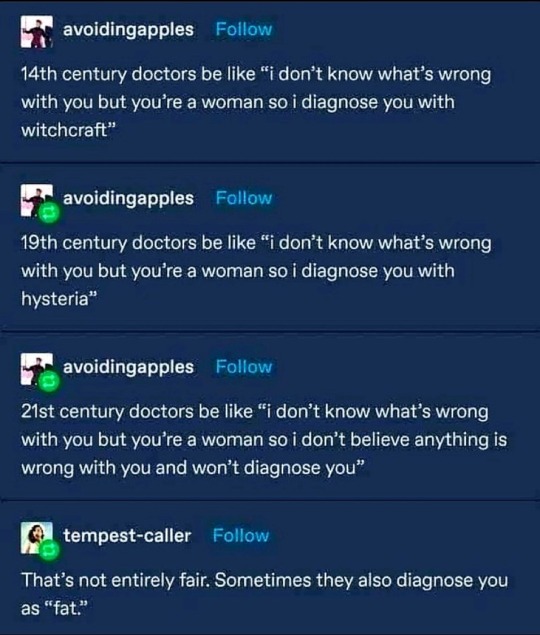
#women’s equality#women’s equity#feminism#women’s rights#inequality in medicine#listen to women#rndm
269 notes
·
View notes
Text
This is not Satire
#american healthcare#healthcare#health insurers#health insurance#health inequality#california#politics#republicans#democrats#uninsured#health#health and wellness#black health#medicine
48 notes
·
View notes
Text
Good News - June 1-7
Like these weekly compilations? Support me on Ko-fi or $Kaybarr1735! Also, if you tip me on Ko-fi or CashApp (and give me some way to contact you if it doesn’t automatically), at the end of the month I'll send you a link to all of the articles I found but didn't use each week!
1. Hundreds of Mayors, City Leaders Commit to Protecting Monarch Butterflies in Annual Pledge

“The 300 participating communities are taking a record number of actions to advance monarch conservation by planting or maintaining pollinator gardens at prominent locations, supporting native plant sales and giveaways, and partnering with local gardening organizations and experts to advance monarch conservation and community engagement.”
2. Basic income can double global GDP while reducing carbon emissions, analysis suggests
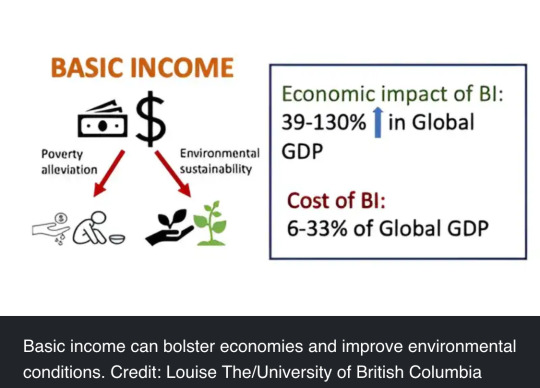
“Researchers suggest that charging carbon emitters with an emission tax could help fund such basic income programs while reducing environmental degradation. [… G]iving basic income to the entire world population could boost the global GDP by $163 trillion, which is about 130% of the current GDP. Every dollar spent on implementing basic income can generate as much as $7 in economic impacts, the analysis shows.”
3. Los Angeles-area wildlife crossing over freeway expected to be ready in 2026

“The crossing will be a vegetated overpass that will help isolated animals safely cross U.S. 101. […] Officials said the Wallis Annenberg Wildlife Crossing will "reconnect habitats and improve the health of the environment for many species in Southern California." They added that currently, U.S. 101 is a huge barrier that disconnects Southern California wildlife. […] “We need to move beyond mere conservation, toward a kind of environmental rejuvenation," [Annenberg] said in a statement. "Wildlife crossings are powerfully effective at doing just that — restoring ecosystems that have been fractured and disrupted.””
4. ‘Many waterfowl are very gay’: Elliot Page set to narrate LGBTQ+ animal documentary Second Nature

“According to Deadline, Second Nature will be executive produced by Page, who will also narrate the documentary set to explore instances of same-sex attraction in species other than humans. And, spoiler alert, they’re everywhere. [… Page said,] “Second Nature reveals the full spectrum of life and how when it comes to gender and sexuality in nature, the diversity is endless. I learned so much and am thrilled others will too.””
5. McKenzie River Restoration Benefiting Threatened Upper Willamette River Chinook

“Salmon have successfully reproduced at the Finn Rock restoration site in Oregon’s McKenzie River watershed. Another project aims to bring salmon back to lower Quartz Creek. […] Historical accounts document the presence of Chinook salmon and bull trout in Quartz Creek, but neither species has been seen there for decades. Project partners have replaced an aging bridge that constricted Quartz Creek. Previously, the stream constriction forced the water to gush like a fire hose, blasting salmon and sediment downriver. […] The restoration work will increase groundwater and expand the amount of wetlands, which can reduce the impact of forest fires.”
6. Leading Scholars Call for Global Treaty on Free Education

“According to the experts, well-established scientific evidence shows “unequivocally” that education is foundational to children’s healthy development and lifelong prospects[…. Seventy scholars from thirty countries] call on all governments to support a new optional protocol to the Convention on the Rights of the Child to ensure recognition of the right to free early childhood education and free secondary education, alongside the existing explicit right to free and compulsory primary education.”
7. Water is key as study shows restoration of drained tropical peat is possible
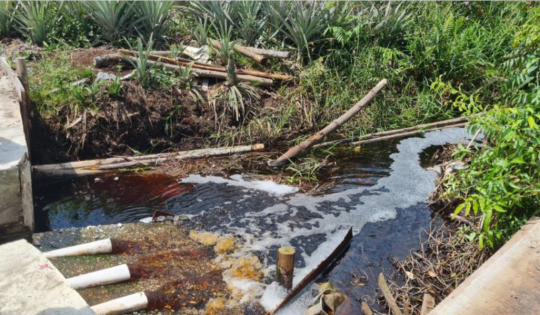
“Rewetting of tropical peatland that was drained for agriculture can lead to the recovery of the native ecosystem, a long-term study of a former pulpwood plantation in Indonesia shows. Researchers studying the 4,800-hectare (11,900-acre) plot that was retired in 2015 by Asia Pulp & Paper (APP) found the water table had risen, soil carbon emissions had gone down, and native trees were springing up and replacing the planted acacia pulpwoods.”
8. Antioxidant gel preserves islet function after pancreas removal: New approach could reduce diabetes complications

“Before surgeons remove the pancreas from patients with severe, painful chronic pancreatitis, they first harvest insulin-producing tissue clusters, called islets, and transplant them into the vasculature of the liver. […] Unfortunately, the process inadvertently destroys 50–80% of islets, and one-third of patients become diabetic after surgery. [… To] create a healthier microenvironment for the islets, the researchers adhered the islets to the omentum with an inherently antioxidant and anti-inflammatory biomaterial[…,] significantly improving survival and preserving function of transplanted islets.”
9. Restoring Indigenous aquaculture heals both ecosystems and communities in Hawai‘i

“The loko i’a system of native fishponds in Hawai‘i has for generations provided sustenance to Indigenous communities[….] Unlike commercial fish farms, loko i‘a thrive without feed input and need little management once established[….] “We are using science to translate ‘ike kupuna, or Indigenous knowledge, into policy,” said study co-author Kawika Winter […] “Loko i’a are really built to work with the ecosystem, whereas not all forms of aquaculture are made to do that.””
10. Meet Neo Px: the super plant that attacks air pollution

“Neo Px is a bioengineered plant capable of purifying indoor air at an unprecedented scale[….] "It's the equivalent of up to 30 regular houseplants in terms of air purification," said Lionel Mora, co-founder of startup Neoplants. "It will not only capture, but also remove and recycle, some of the most harmful pollutants you can find indoors." [… The plant comes] with packets of powder that contain a microbiome, essentially a bacterial strain. "This bacteria colonizes the plant's roots, soil and leaves [… and] absorbs the VOCs to grow and reproduce. The plant is there to create this ecosystem for the bacteria. So we have a symbiotic system between plants and bacteria.””
May 22-28 news here | (all credit for images and written material can be found at the source linked; I don’t claim credit for anything but curating.)
#hopepunk#good news#income inequality#basic income#los angeles#wildlife#habitat#elliot page#lgbtq#gay rights#nature#fish#salmon#river#california#agriculture#education#human rights#science#medicine#health#pancreatitis#diabetes#hawaii#monarch butterfly#butterfly#butterflies#butterfly migration#conservation#plants
33 notes
·
View notes
Text
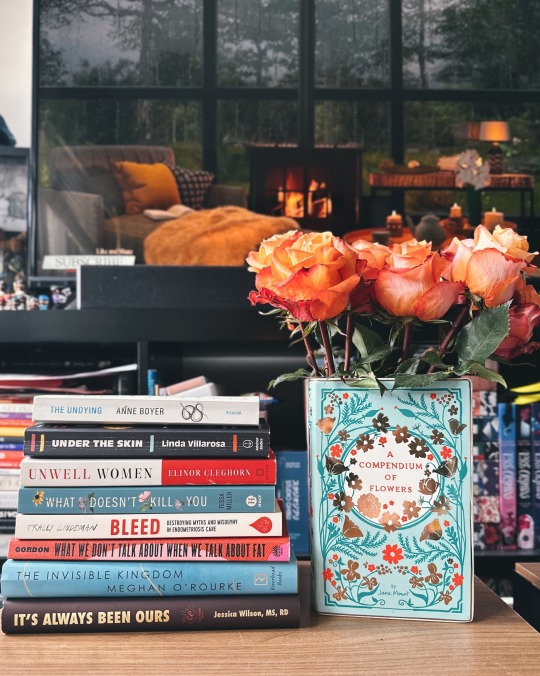
You all know that healthcare inequity is an important issue for me. I recently gathered a second stack of books together, a stack of incredible, eye-opening books about healthcare feminism, body justice, and advocacy. Each one of these books has helped to change my perspective and broaden my knowledge about the issues in our healthcare system today, from dismissal to misdiagnosis to chronic pain. Check out my list!
#health feminism#healthcare inequity#body justice#endometriosis#chronic illness#chronic pain#book stack#bias in medicine#book riot
123 notes
·
View notes
Text
at the end of my fucking rope with "conversations" about k12 chronic absenteeism.
#sorry. work rant#next time you read a headline about it think to yourself. why is it schools' job to get kids to come to school.#why do schools have to bend over backward to cater to kids#kids not wanting to go to school is an extremely common occurrence#the difference now is that the responsibility is being shifted off kids and parents and onto schools#i get that schools can do better i really do#i think there is a shared responsibility#but there is a profound belief across society that school is not important and does not matter#and that needs to be addressed too#i'd say 99% of the examples i hear of systemic school problems are actually just examples of individual bad actors#again. schools have issued that need to be addressed! the public school system has profound inequities!#but when the only problems you point out are 'a kid was mean to my kid' or 'a teacher wasn't as nice as they could be'#you're not interested in changing the system#you're interested in changing your kid's experience#and guess what. demonizing school staff sure isn't going to fix anything#at this point I don't see myself ever going back to teaching#you know who will go into teaching? people who don't give a shit.#and that's not going to help anything either.#you can't attract people who care when people who care are punished and chased out#imagine if instead of constantly bringing up the worst possible examples and insisting they are representative of everyone#the good examples were celebrated and rewarded#same thing happens with the medical profession btw#and again. lots of legitimate examples of harm#(i'm fat ffs i know this)#and also I think it's dangerous to have people delegitimizing medicine to the point that crystals are seen as just as valid as a doctor#sorry. separate rant.#but still. delegitimizing professions that require knowledge skill and training is how we get thousands of unqualified people#homeschooling their kids and treating them with herbs they got from their local Etsy witch
9 notes
·
View notes
Text
Anatomy of a Broken System: On Medical Inequality and Why I Chose Not to Become a Doctor

Following the political uproar of the Luigi Mangione case and the ensuing discussion on healthcare reform, I found myself reflecting on my own relationship with the healthcare system. After the tragic and unjust deaths of my grandma due to diabetes complications and later my neighbour, who died of kidney surgery complications at just 20 years old, I had long ago distanced myself from pursuing a medical career path, realising that even if I dedicated my life to the field, saving lives like those dear to me might still be impossible.
Medicine may be humanity’s shared endeavour to preserve life, but the yield of such collective effort remains disproportionately distributed. Today’s healthcare industry undoubtedly places profits above people, often jeopardising those of a lesser social and economic standing. Though my mum urged me to serve in white and try to save lives like her mother’s, I refused what felt like a futile pursuit. The medical system has failed the collective too frequently for my participation to make a meaningful difference — a truth I couldn’t articulate at the time but instinctively understood.
The Hierarchy of Healthcare

Through watching miracle surgeries performed on TV during my childhood and witnessing the many preventable deaths in my adolescence, I have come to understand that the healthcare system always played favourites. According to the Health Foundation, people living in impoverished areas have worse health outcomes and tend to die earlier [2]. These deaths are not complicated or unfeasible procedures, but rather illnesses that medicine has tackled for centuries. It is being able to afford insulin pumps every month. It is being operated on with sanitised surgical equipment. It is an insured-covered follow-up visit to the doctor after a new treatment. In the same vein, Cody Jacob shares how his mother died of diabetes complications due to her insurance denying coverage of her essential supply, which included pumps, insulin, tests, batteries, wipes, etc. Horrifically, her insurance only approved coverage for those supplies once her status had changed – to deceased [3].
Medical recovery heavily relies on economic access. The cure to the deaths plaguing our societies is often unattainable for its most vulnerable members as, for example, many lower-class Americans remain uninsured [4]. This gap in access extends beyond life-saving medication. Preventative care and mental health services are also disproportionately distributed [4], deepening cycles of inequality. While individual doctors may save lives, they still operate within a system that constrains their ability to influence widespread change. So, when the healthcare costs continue to rise while the quality keeps declining [1], we have to ask: where does the money go?
In Service of the Elite

Such questions often go unanswered since medicine, alongside many other STEM fields, has served those on top first, its benefits only trickling down over time. As one progresses in their medical career, they become more entrenched in fulfilling elite interests. Even working in impoverished areas can feel limited in impact, as structural barriers and industrial control remain intact. While current narratives might delude us to idealise capitalistic medicine, history paints a different picture. For example, from the late 19th to the mid-20th century, there was a dramatic reduction in mortality rates, particularly in England. This improvement was primarily due to public health initiatives like sanitation, clean water, improved housing, and vaccinations, not capitalist-driven innovations. In fact, the early capitalist class often resisted these improvements, as they involved increased taxes and infrastructure investments [5].
Still, the healthcare industry continues to promote the idea that privatised healthcare is more efficient, despite evidence suggesting that public systems often deliver better outcomes at lower costs [5]. Disturbingly, the media pushes a narrative that glorifies ‘consumer choice’ to justify the commodification of medicine while ignoring social determinants of health, such as inequality, poor housing, and limited access to education. It focuses on health being an individual responsibility when, in reality, individual choices only account for 20% of health outcomes, the rest determined by socioeconomic factors [2].
Medical discrimination extends to the academic world, as research funding is skewed toward issues affecting wealthier nations rather than systemic reforms. Diseases that disproportionately affect women and Black populations receive smaller funding increases compared to its counterparts [6]. This consequence is partly due to lower advocacy for those groups combined with neglect for decision-making metrics, such as dollars per death, that allocate funding to address much critical mortality concerns. Agócs [7] has defined such resistance embedded in organizational processes, policies, and power structures as Institutionalised Resistance, which manifests as denial, inaction, and repression, rendering individual efforts to disrupt the system futile. However, there have been efforts that were prosperous, such as West Africa’s Ebola outbreak response, celebrated for its data-driven, patient-centred, and localised community engagement strategies to control the epidemic [8]. Such success presents us with hope for wide-scale reform within the medical world.
Practicing Medicine in Vacuum

But if we truly desire such change, we must accept the harsh truth: medicine under capitalism has never been neutral, evident by the unfair distribution of medicinal resources and the stark disparities in health outcomes. As such, absolute medical advancement should not be exalted, as it is not but propaganda that serves the elite. Blindly advocating for progress in medicine above all else abandons critical thought about the urgent realities facing our communities. Many medical professionals and academics join the field wanting to save lives but end up only saving those deemed "valuable" by economic and social standards. That was the reality that I knew I would regret living if I joined the field following the loss of my grandmother. After all, those millions of preventable deaths [9] would continue to happen.
The culture of glorifying medicine strays us away from developing tools to think critically, tackle the bigger picture, and reevaluate our priorities. Unfortunately, medical professionals are discouraged from contextualising their work within social and economic spheres, focusing heavily on scientific expertise, honour, and prestige. As a child of Black-Brown immigrant parents, I have experienced immense pressure to enter the field for similar reasons – even though my interests lay in social problem-solving and storytelling, my strengths being far from applicable in the biological world. I felt obligated to ‘make the best use of my gifts’ and to choose a study that was actually beneficial, which, in my community, only meant STEM.
Today, medicine operates like a tool of the bourgeois system, used to decide who deserves to live. Entering the field means participating in a game rigged against the poor. Our communities cannot afford to play the game passively anymore. We must think bigger, addressing systemic inequalities rather than merely treating their symptoms. In the current capitalistic atmosphere, critically choosing a career path might be the most political statement an individual choice can make. My creative and humanistic passions might not have always been valued in my younger years, even by me. But now, more than ever, I understand the value in engaging in them: to advocate for and express oneself is to engage in political advocacy, social expression, and systemic change.
Bibliography
Brown, A.: Opinion | Capitalism Versus Compassion: Can Healthcare Do Both?, https://www.medpagetoday.com/opinion/prescriptionsforabrokensystem/104139.
eGPlearning: Addressing Health Inequality in General Practice, https://www.youtube.com/watch?v=Tvu--5tmK1M, last accessed 2025/03/18.
Jacob, C.: It took my mom dying for insurance to cover her needs!, https://www.tiktok.com/@imcodyjacob/video/7445339073356631342?is_from_webapp=1&web_id=7443142350052034056, last accessed 2025/03/28.
Economic Barriers to Healthcare Access, https://www.cliffsnotes.com/study-notes/23073691, last accessed 2025/03/28.
Leys, C.: Health, health care and capitalism. Socialist Register. 46, (2010).
Best, R.K.: Disease Politics and Medical Research Funding. American Sociological Review. 77, 780–803 (2012). https://doi.org/10.1177/0003122412458509.
Agócs, C.: Institutionalized Resistance to Organizational Change: Denial, Inaction and Repression. Journal of Business Ethics. 16, 917–931 (1997). https://doi.org/10.1023/a:1017939404578.
Braithwaite, J., Mannion, R., Matsuyama, Y., Shekelle, P., Whittaker, S., Al-Adawi, S., Ludlow, K., James, W., Ting, H.P., Herkes, J., Ellis, L.A., Churruca, K., Nicklin, W., Hughes, C.: Accomplishing reform: successful case studies drawn from the health systems of 60 countries. International Journal for Quality in Health Care. 29, 880–886 (2017). https://doi.org/10.1093/intqhc/mzx122.
Kruk, M.E., Gage, A.D., Joseph, N.T., Danaei, G., García-Saisó, S., Salomon, J.A.: Mortality Due to low-quality Health Systems in the Universal Health Coverage era: a Systematic Analysis of Amenable Deaths in 137 Countries. The Lancet. 392, 2203–2212 (2018). https://doi.org/10.1016/s0140-6736(18)31668-4.
Credit
Different types of mold grown in Petri Dish - Home DIY lab - Bacterial Culture, KABOOMPICS
#medical inequality#healthcare justice#capitalism kills#medicine under capitalism#systemic oppression#healthcare reform#anti capitalism#social determinants of health#public health crisis#medical industrial complex#why I never became a doctor#personal essay#immigrant voices#decolonize medicine#grief and resistance#Black and Brown voices#STEM narratives#career pressure#medical disillusionment#humanities#social science#health politics
6 notes
·
View notes
Text
I took a first aid class today. It was very informative and the firefighter teaching it said more than once that, when in doubt, it is best to call an ambulance.
This is good advice, but I wish I said something about about the cost of ambulance rides in the US.
Because people don't avoid calling ambulances because they think they're fine. People avoid calling ambulances because they're afraid of going bankrupt.
I would feel awful if I put someone in deep medical debt because I called an ambulance for them. I hate it here.
#income inequality#socialized medicine#socialized healthcare#socialism#late stage capitalism#anti capitalism#medical debt#debt
4 notes
·
View notes
Text
while i wouldn't like living in any other time period due to knowing like. The basics of history or whatever, I'm gonna be real with you all. The current one I'm living in isn't all that appealing either.
#i enjoy the comforts of modern medicine and plumbing too much to live anywhere else#and i also enjoy being able to open my own bank account despite being born without a dick#but man. things could be better#and in a hundred years people will romanticise us and say they were born in the wrong decade#and someone else will say that the social issues and limitations of our medicine/technology would make it terrible#and that's just how it goes#the same will happen to those people and those people and those people#and they'll wonder how we dealt with the inequality and were there any joy there at all#and there was joy and beauty despite it all just like it was before and we kust keep going and ugh#idk what im rambling about
9 notes
·
View notes
Text
Why I don’t like going to the doctor:
1) It always starts with my parents telling me I don’t need to go to the doctor.
2) Then I sit in a waiting room for 3 hours.
3) I get in with the doctor, they either
A) tell me I should have come in sooner
Or
B) say come back if it’s still bugging you in a week or two
4) When I go back they say why didn’t you come in sooner.
It’s mainly because my body doesn’t really process pain properly so sometimes I don’t really notice something is up until most people would be really uncomfortable and concerned. Doctors ask me how I’m feeling or to rate my pain but I fractured several bones in my ankle and was still able to walk around for 3 weeks.
I think our medical systems need to adapt better to neurodivergent patients with abnormal pain tolerances as it’s incredibly frustrating to have to explain that you aren’t faking every time you go to the doctor because sometimes you genuinely don’t notice until something is really bad.
#actually neurodivergent#adhd#mental health#adhd blog#neurodiverse stuff#actually adhd#actually audhd#adult adhd#pain tolerance#medicine#inequality#sensory issues
14 notes
·
View notes
Text
Compliance, per the two main approaches to medical sociology
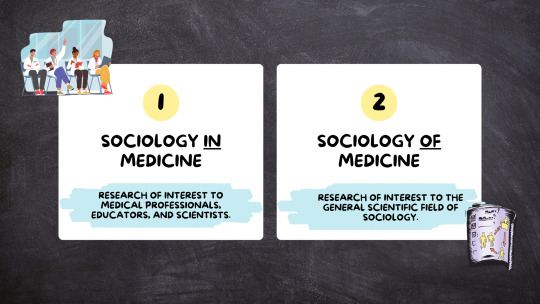
Sociology in medicine is research that’s of interest to medical professionals, medical educators, medical scientists— things that are important to medicine as an institution.
Sociology of medicine tends to be research of interest to the general scientific field of sociology, not only sociologists who study matters of medicine, health, illness, healthcare, and disability. Importantly, it is not that medicine is simply disinterested in sociology of medicine, the institution of medicine sometimes has a vested interest in silencing or arguing against sociology of medicine. Sociology of medicine may not be useful to medical professionals, but if, for example, sociology of medicine is critiquing medical practice, as is often the case, it might move beyond useless to being perceived as offensive.
To further explore the difference between sociology in versus of medicine, let’s take the issue of compliance.

From the medical perspective, patient compliance is vital for successful medical practice and treatment. if your patient is not listening to you–for example, if they’re not taking their medication, and that medication is supposed to get them better, than you are going to have a much more difficult time treating that patient, and thus, a much harder time doing your job, than if the patient “complied” with your treatment plan. Same thing if your patient won’t have surgery. Well, if operating is the way that you do your job and the patient refuses, you cannot do your job as well. So, sociology in medicine would examine compliance with this medical perspective in mind. Sociology in medicine might investigate the barriers to patient compliance, and they might ask about these barriers in terms of patient behavior, asking something like "why are these patients non-compliant?" with the goal of identifying things that can be addressed to help patients better comply, so that medical professionals can have better chances of success when trying to do their jobs.
Now, moving to sociology of medicine—the greater field of sociology is interested in issues of power and inequality. When examining compliance in terms of power and inequality, we might look at something like physician control over patients, which would contribute to areas of sociology beyond medical sociology, such as the larger sociological literature on deviance and social control.
From this perspective, physicians offer something that patients cannot obtain on their own—prescription medications, surgery, imaging…these are all things that are considered both illegal and dangerous when obtained from non-credentialed entities. This means patients must be compliant to avoid severe consequences, like physical injury, disability, or even death. Healthcare providers hold power to help people feel better when they have few, if any, safe alternatives.
Instead of looking at compliance as inherently positive or necessary, we can critique the concept, and most importantly, the continued endorsement of compliance as “positive” and “necessary” by credentialed actors in medicine. So, sociology of medicine, similarly to sociology in medicine, may examine barriers to compliance, but because it does not assume compliance is necessary or helpful to the patient, it leaves room to explore the patient experience. Sociology of medicine can explore things like mistrust of medical professionals, experiences with bias and discrimination in the clinical encounter, and the patient’s understanding of a potential treatment as helpful versus their belief that the treatment is useless (independent of the science on said treatment’s effectiveness).
So, while sociology in medicine and sociology of medicine might both be interested in the question of “why do patients become noncompliant,” sociology in medicine might approach that question with the intent of identifying something that will lead to increased compliance, whereas sociology of medicine may approach the question in terms of medical harm, so not taking the assumption that compliance is positive, instead, taking the more skeptical view that compliance might be an exercise of power on the part of the healthcare provider over the patient and focusing on issues like the potential for patterns of exploitation and/or harm of certain groups of patients with shared characteristics. Sociology of medicine might ask whether healthcare providers, because they are powerful, are inherently good or right. Sociology in medicine would probably not ask this question at all, instead assuming the answer to be "yes"
youtube
#sociology#studyblr#phdblr#social science#medblr#health science#research#paradigm#medical sociology#sociology of medicine#sociology in medicine#compliance#power#inequality#deviance#social control#medical sociology 101#Youtube
3 notes
·
View notes
Text
Why?
#american healthcare#american health system#embarrassing#uk#healthcare costs#europe#republicans#politics#democrats#black health#health#medicine#medicare#medicaid#health insurance#donald trump#health inequality#health insurers
27 notes
·
View notes
Text
Making Sense of the Senseless
It’s a strange time, stranger than any I can remember in the second half of my life. If you try to summarize the number of global issues our nation faces, it begins to feel unprecedented. There is violence on three fronts in Israel arising from the horrific terrorist attacks of Hamas. There is the question of how Iran and Hezbollah will accelerate that conflict. Putin is still waging a brutal…

View On WordPress
#compartmentalizing#education gap#healthcare costs#income inequality#israel#Kim Jong Un#modern medicine#monthly sales quota#passive aggression#Putin#semblance of humor#senselessness#Taiwan#trailing-edge baby boomer#Ukraine#Wall Street Journal
2 notes
·
View notes
Text

Explaining the mortality disparity between high- and low-income Americans: "Saved by Medicaid: New Evidence on Health Insurance and Mortality from the Universe of Low-Income Adults" @nber.org (Plus- Susan Lindquist)
Contemplating care: https://roughlydaily.com/2025/06/05/the-first-wealth-is-health/
#biology#culture#health#healthcare#history#immigration#inequality#medicare#medicaid#medicine#ilovemicrobiology#mortality#politics#protein#proteinfolding#science#susanlindquist
1 note
·
View note
Text
Students at Historically Black Colleges and Universities Face Barriers to Medical School Admission, Study Finds | Newsroom
0 notes
Text
One of my favorite choices the Apothecary Diaries made was making the Emperor a “normal guy” (as far as I know as an anime-only). He’s not evil. He’s not hindering Mao Mao’s journey. He respects the concubines.
If anything his lack of autonomy and presence as the most powerful person in the country further enhances the show’s themes of working within the confines of class and gender inequality.
The previous emperor was a horrible, horrible pervert. Okay, then this emperor only weds women of age… Until he’s forced to take his father’s precious wife due to politics. The current emperor reasonably avoids her.
Eunuchs exist? Bam! now the surgery is outlawed, but this will create a reduction in male labor around the palace.
The emperor clearly favors few women. Well, now he must recognize a concubine with a powerful politician father playing the system.
He supports Mao Mao toeing the line of social expectations for women, but hasn’t removed the law against women preparing medicine. It makes one think, if he wanted to, could he make the change at all? For every two steps forward, he’s forced to take one step back.
In this universe even the Emperor is limited by social pressure and the expectations of his station. His life and that of his children is out of his control, and if that isn’t such a compelling piece of world building I don’t know what is.
If that’s how the author twists the narrative of the Emperor you better believe her female characters dealing with women’s issues in this society are even better written.
#you should all watch the apothecary diaries#I’m all caught up and starting the manga#never read a manga before#and despite knowing what’s going to happen in a MYSTERY I’m still locked in#guys it’s so good#I can’t wait to finish the manga and then jump into the light novels and read it all AGAIN#the apothecary diaries#kusuriya no hitorigoto#and if I’m wrong about the emperor please don’t tell me#no spoilers please#though this has spoilers up to the most recent episode#maomao#tagging the queen because she’s mentioned#these characters!!!!#wrote this instead of my discussion post for class🤪
7K notes
·
View notes
Text
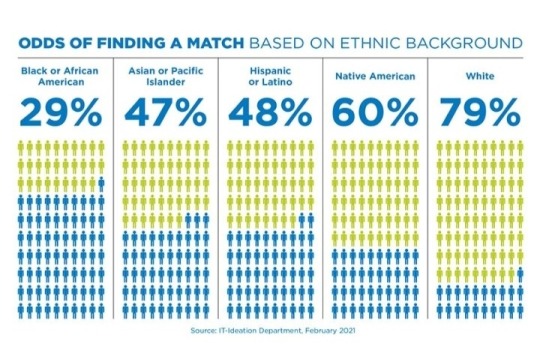
These are the official statics form cancer. gov, a us government website. It's a clear illustration of inequalities in modern medicine- here, in a chance of getting a transplant. It's a live-saving procedure that not everyone could get because your DNA needs to match with someone else's. Some people are lucky to have found a match in their immediate family where the chance of it is the greatest but not everyone is so lucky.
That's why people need to donate!!!
I am literally begging you. We NEED bigger pool of available donors!!
IF YOU ARE A PERSON OF COLOR YOU SHOULD BE AWARE THAT YOUR CHANCE OF FINDING SOME SUITABLE DONOR IS 2.7 TIMES LOWER OF THAT OF A WHITE PERSON.
THE TANGIBLE FREE THING YOU CAN DO TO HELP YOUR COMMUNITY IS REGISTERING!
It's completely free (as in they give you back the salary from the days they made you miss + transport costs)! You would even get a chocolate bar! Most of the people who register won't get chosen anyway and donating bone marrow is almost the same as giving blood.
Spread awareness!!!
#medicine#organ transplant#organ donor#inequality#racisim#racial justice#native american#people of color#african american#latino#advice
0 notes